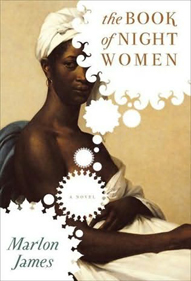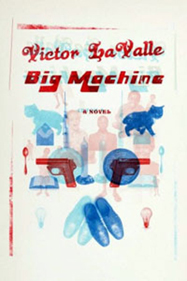-
March 25, 2010
Quarterfinals
-
Commentary by
Kevin Guilfoile & John Warner
-
Today’s Winner:
4The Book of Night Women
Kevin: Obviously we didn’t deliberately construct this year’s ToB in order to force Carolyn Kellogg to oust a promising young black novelist from the tourney, just as we also didn’t plan on me writing a cogent commentary while trying not to think about the location of Carolyn Kellogg’s mythical Pynchon tattoo. I guess we’re even.
John: Given Pynchon’s reclusiveness, I have to wonder exactly what that tattoo might be. Is it of Pynchon himself? Perhaps this old, Ed Grimley-esque version? The mind reels.
Kevin: Let’s continue the conversation we had yesterday about the kinds of novels that stimulate our pleasure centers. Knowing nothing about these two books other than the jacket copy, I would have chosen Big Machine over The Book of Night Women. I just dig that kind of book. What are we calling it now, speculative fiction? (I guess that’s also sort of what I write, now that I think about it.) The Book of Night Women has been praised so eloquently by so many people I respect, however. There is you, whom I have known for more than a decade, and Max Magee, and now Carolyn Kellogg, whom I have read for years and about whose bicep or ankle or possibly left shoulder blade I have recently started daydreaming. I will read that book now. And also Big Machine, but probably Night Women first. This is how the TBR list shuffles.
Speaking of which, yesterday you generously volunteered to recommend books to readers based on the last five books they enjoyed, kicking off an internet phenomenon. (Due to the high-volume demand, the recommendation machine is closed for now, but we’re looking into ways to revive it later.) It was great fun and kind of fascinating to watch.
I’ll also argue without any proof that this is fundamentally different from the kinds of recommendation machines offered by Amazon, which base their suggestions on customer purchases, or even Netflix, which bases recommendations on customer ratings. You are looking at the books these readers like and turning that into assumptions about the person, which leads you to a particular title. There’s a human element that tries to address the voodoo of reading we discussed earlier. It’s a Rorschach test of sorts. Even though it’s nothing more than a list followed by your recommendation, it feels almost voyeuristic to read through them.
John: I’m actually a big user of the Amazon suggestions, not in the sense that I click away, virtually hurling things into my online shopping cart, but it often puts books on my radar that I’m unlikely to be aware of otherwise.
As Carolyn Kellogg well knows, the shrinking review space in our major media outlets means there’s just a lot less coverage of books, and the coverage that does exist tends to cluster around a relatively small handful of titles. Because of the massive Amazon customer base, we’re looking at a true wisdom-of-crowds-type phenomenon where I can get access to the radars of everyone who reads books remotely similar to me. It’s what makes Amazon really function like a bookstore because it replicates (using data and algorithms) what independent booksellers do—establishing an ongoing relationship to a reader and helping to guide their choices into the most promising territory.
It’s why I think a store like tourney sponsor Powell’s remains so vital. At the amazing flagship store specifically, they have literally everything and there’s actual human beings inside that can help you work through the choices.
I’ve mentioned this in previous commentaries, but my mother owned an independent bookstore from when I was age one to 22, and it was this service, the ability to suggest books that her clientele would like, that kept it going. (It still exists, meaning it’s closing in on 40 years. Even when Crown came to town in the ‘80s with their loss-leader bestseller discounts, my mother’s shop was able to weather the storm because she provided a demonstrably valuable service.
We talked about it in a previous commentary, how books tend to resist mass marketing, and I think people’s willingness to take a recommendation from me illustrates that. My belief is that advertising and marketing books can only achieve one thing: awareness. After that, if a book is going to succeed, it’s going to be a function of word of mouth.
I worry as much as anyone about the hegemonic tendencies of Amazon, particularly in the burgeoning digital market, but the free marketer in me has to be impressed with their ability to create a place that extends far beyond a simple act of e-commerce and helps to create a kind of book community.
Kevin: I’m not at all trying to dump on Amazon (which also offers customer reviews, etc.), but I’ll also argue that there is something qualitatively different between a person making a recommendation and the Cyberdyne netbots making one. There’s a value to that, but it’s not equal to a person who considers not just that you once purchased a particular book or even that you once enjoyed a particular book. The human being also factors in why you enjoyed it and compares that to her own reading experience.
The pleasure of reading is surely one of the things that makes us human and I’m not ready to turn the process over to artificial intelligence.
One reason to resist a complete surrender to the e-book is that physical books lined up on actual shelves remind us that art is not a commodity. Consuming it requires thought. It requires thoughtfulness. It’s the one thing I disagreed with in that Craig Mod article you linked earlier. Most novelists do not perceive their books as being formless waterfalls of text. They do think about how their words will look on a page, and how they will be absorbed. I’m not a Luddite and I also will be tackling certain novels on an e-reader—but when we do that I think it’s important to remember what we’re trading for convenience.
Novels are not like orange juice that can just be poured indiscriminately into your Kindle. Or they shouldn’t be, according to me.
I also want to point, humbly, to a very generous article by Salon’s Laura Miller that I think captures the essence of the Tournament of Books, at least the way we have always seen it. We thank her especially for the part where she says the ToB “has bloomed into a rare pocket of civility and informed intelligence.” I’m guessing that was written before Tuesday.
John: I too am pleased and humbled by Ms. Miller’s article, but feel undeserving of such praise. You’ve pointed out our failure on the civility test. Let me throw the flag on the informed-intelligence front by setting the way-back machine to 2006, where in the Semis, as Ali Smith faced off with Sam Lipsyte, rather than commenting on the actual books, I instead proposed a national kidney lottery.
Kevin: Your pre-Tournament prediction that The Book of Night Women would go deep into the brackets completely eliminates the lead I’d been slowly building throughout the tourney. You placed it very high in your confidence rankings (second only to Let the Great World Spin) and you now lead our side bet, 157-154.
Most importantly, we have our Semifinal matchups. Tomorrow we take a break from competition for more excellent statistical analysis, courtesy of Andrew Seal. Then on Monday Let the Great World Spin takes on The Lacuna, and on Tuesday Wolf Hall meets The Book of Night Women. After the Semifinals will be our Zombie Round, in which the winners of those matches must fight their way past books left for dead but resurrected by the secret results of a pre-Tournament poll of TMN readers.
Big Machine cannot crack that list of Zombie younglings, however. I.e., in our pre-Rooster poll, these Zombie hopefuls received more votes from you, the readers. The list remains, alphabetically:
- Everything Ravaged, Everything Burned
- Fever Chart
- A Gate at the Stairs
- Miles From Nowhere
Kevin Guilfoile is a contributing writer for TMN. His debut novel, Cast of Shadows, has been translated into more than 17 languages, and his second novel, The Thousand, will be published in August 2010 by Alfred A. Knopf.
John Warner is a contributing writer for TMN. He is the author of Fondling Your Muse: Infallible Advice From a Published Author to the Writerly Aspirant. He teaches at Clemson University.

















